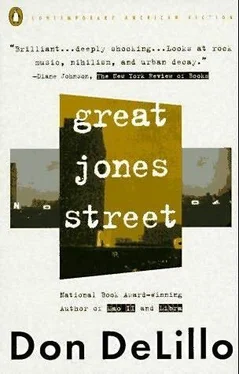Don DeLillo - Great Jones Street
Здесь есть возможность читать онлайн «Don DeLillo - Great Jones Street» весь текст электронной книги совершенно бесплатно (целиком полную версию без сокращений). В некоторых случаях можно слушать аудио, скачать через торрент в формате fb2 и присутствует краткое содержание. Жанр: Современная проза, на английском языке. Описание произведения, (предисловие) а так же отзывы посетителей доступны на портале библиотеки ЛибКат.
- Название:Great Jones Street
- Автор:
- Жанр:
- Год:неизвестен
- ISBN:нет данных
- Рейтинг книги:3 / 5. Голосов: 1
-
Избранное:Добавить в избранное
- Отзывы:
-
Ваша оценка:
- 60
- 1
- 2
- 3
- 4
- 5
Great Jones Street: краткое содержание, описание и аннотация
Предлагаем к чтению аннотацию, описание, краткое содержание или предисловие (зависит от того, что написал сам автор книги «Great Jones Street»). Если вы не нашли необходимую информацию о книге — напишите в комментариях, мы постараемся отыскать её.
Great Jones Street — читать онлайн бесплатно полную книгу (весь текст) целиком
Ниже представлен текст книги, разбитый по страницам. Система сохранения места последней прочитанной страницы, позволяет с удобством читать онлайн бесплатно книгу «Great Jones Street», без необходимости каждый раз заново искать на чём Вы остановились. Поставьте закладку, и сможете в любой момент перейти на страницу, на которой закончили чтение.
Интервал:
Закладка:
"I'm the woman downstairs," she said. "Up-on-three told me there was a new person. You're not noisy, that's for sure. If it's too cold, hit the pipes. Micklewhite. Downstairs from you."
"Right."
"I been here it seems like a hundred years. My husband used to be the super. But he died of complications. I take care of sending up the heat. If you get cold, hit twice on the pipes. My kid inside isn't normal. Don't worry if you hear noises."
"It doesn't get very loud."
"My husband had all kinds of cockamamie ideas. First off he wanted to sell the kid to a carnival. But who'd buy him? They wouldn't be able to sell enough tickets for all the trouble it takes to take care of him. Then he wanted to rent him out to colleges where they have doctors and nurses studying in there. I put the kibosh on that. I said you're dreaming. I said nobody wants to look at this kid. I said the only thing to do is leave him here and keep the door closed."
"What's his name?" I said.
"His name? He don't have a name. We never figured he'd live past four months with a head like his head. But did we get fooled. Did we get stuck with a lemon. My husband, he figured make the best of it. Find an interested party and either sell the kid outright or lease him by the month. Carnivals, they have seasons. Take him, bring him back, take him, bring him back. You should have seen that s.o.b. He used to work out schemes and plans and arrangements, left and right. I said hooey. I said you're dreaming. I said you'll have to go to the booby hatch to find an interested party. He wanted to take out ads, my husband. Carnivals, they have special newspapers. He kept working out plans and more plans and more plans until the day he keeled over. You should have seen him keel over. It was just after the second operation. Tessie was here, the candy store's daughter. We watched him keel right over. I told Tessie I said I bet it's complications. But he had big plans. You should have seen him talk. He was only this big but he had a mouth on him like a power saw. I'll tell you what he was because you wouldn't guess it if you saw him. He was a horse pervert. He went to the track rain or shine. Him and the chink from the Bronx, they went to the track in blizzards with their hats down over their ears. He lost thirty, forty simoleons on the average every time they went. The chink had winners left and right. The chink knew the scratch sheet, he knew the smart money, he knew the track, he knew the weather, he knew the animals. My husband, he didn't know shit from Shinola. He'd starve himself half to death to save enough money to give it to a horse. But don't mind my mouth. I talk and talk and never know what's coming out. It's loneliness, that's all it is. It's living with someone that can't form a word."
I tried to remember what I was doing on the stairs. I had my lumber jacket on but I didn't know where I was headed. I stayed outside the building for a while. A man in a long coat stood in the alley between Lafayette and Broadway. When I went back upstairs it was quiet everywhere. No bowel sounds in the plumbing and little of Fenig tracing his way to productivity. The man from ABC had left his card on the table. Although I'd never seen him on television I was able to recall almost every detail of his appearance. He possessed that high gloss common to interchangeable celebrities, to the male secretaries of important female executives, to lawyers with connections in show business. His clothes had seemed extremely tight, equipped with hidden straps, and he hadn't changed expression for the course of his visit. Television. Maybe it was all a study in the art of mummification. The effect of the medium is so evanescent that those who work in its time apparatus feel the need to preserve themselves, delivering their bodies to be lacquered and trussed, sprayed with the rarest of pressurized jellies, all to one end, a release from the perilous context of time. This is their only vanity, to expect to dwell forever in hermetic sub-corridors, free of every ravage, secure as old kings asleep in sodium.
I undressed for the first time in two days, getting into bed naked and weak, unfamiliar with my own body. Fenig began then, taking long and desperate strides, and the soft boy below, Micklewhite's carnival meat, cried four tunes in the making of a dream.
14
Hashish smoked in motels always seemed mean. I remember the feeling of something in the middle of my head trying to expand, to work itself outward, causing fearsome pressure. We were in motels between flights or performances, or between a flight and a performance, or the other way around. The motel was never quite the same but motel time was identical everywhere we stayed. There were no edges to the tensions of our waiting; it was one blank plane of unsegmented time. We were usually located somewhere on the outskirts of a vast population center (not necessarily a city) and we sat on the bed or floor, never in chairs, sucking up bad hash, waiting for the ever-rumored limousine to come slipping in out of the plastic glades, a comically elegant hearse into which seven or eight bodies might eventually drop, musicians, road managers, long blond girls with perfect legs, most of us in soiled old clothes, mendicant's denim and mauled boots, all rank with weed, trying to encompass the range of inconsistencies and finding this an unworthwhile endeavor.
But it's the rooms we waited in that I recall. Their plainness had a center to it, a remote secret, something one might seek to reach only through the unbent energies of certain drugs. It was a strange thing about hashish used in this environment; it seemed a puppet drug of technology, made and marketed under government supervision, a contingency weapon devised by some hobbyist of the nastier industrial echelons. Nothing was safe and there was no sure way to the center. I became both frightened and totally immobile, distrustful of everyone in the room, growing heavier by the second. A grim organic motor pulsed against the walls of my head. Often I tried to reason my way out of this conjuncture of fear and stone-weight. But there were too many areas of concentrated pressure, there was too much gravity in the universe, and although I never reconciled myself to whatever horror was ultimate I could not resist the systematic truth that I was being subsumed into an even more immobile category, that of chair, bed, room or motel itself. (It was after one of these half-hours of pensive insanity that I came up with the name Trans-paranoia for our spreading inkblot of holding companies, trusts, acquisitions and cabals.) In the plainest of rooms nothing was comprehensible. We waited to be taken to a sports arena, convention center, theater or stadium, there to plug ourselves in, to run the lucky hum through our blood, to give them evil meat to eat, the blind maidens naked on Styrofoam pedestals, the sellers of ancient medicines, the masters of trance, the black stoics exhibiting their puncture marks, the knifemen and poisoners, every head melting in the warp of our sound, its deflected electric howl, ladies screaming from wheelchairs, children in drag, feeble-minded bankers, wine merchants and baby rapers, mystics in heat, translucent boys fondling the tits of missionaries' wives. They pressed against each other, chained to their invisible history, the youngest among them knowing of all needs that one is uppermost, the need to be illiterate in the land of the self-erasing word. I
For the first time in weeks Fenig was sitting at the top of the landing. I paused at my door, feeling certain there was something he wanted to say.
"Every pornographic work brings us closer to fascism."
I went inside, not bothering to lock the door. In a little while he came in. It was a dark afternoon and I lit a candle. Fenig sat at the edge of a straight-backed chair, leaning well forward, easily able to put his fingers to the tips of his tennis sneakers.
Читать дальшеИнтервал:
Закладка:
Похожие книги на «Great Jones Street»
Представляем Вашему вниманию похожие книги на «Great Jones Street» списком для выбора. Мы отобрали схожую по названию и смыслу литературу в надежде предоставить читателям больше вариантов отыскать новые, интересные, ещё непрочитанные произведения.
Обсуждение, отзывы о книге «Great Jones Street» и просто собственные мнения читателей. Оставьте ваши комментарии, напишите, что Вы думаете о произведении, его смысле или главных героях. Укажите что конкретно понравилось, а что нет, и почему Вы так считаете.












